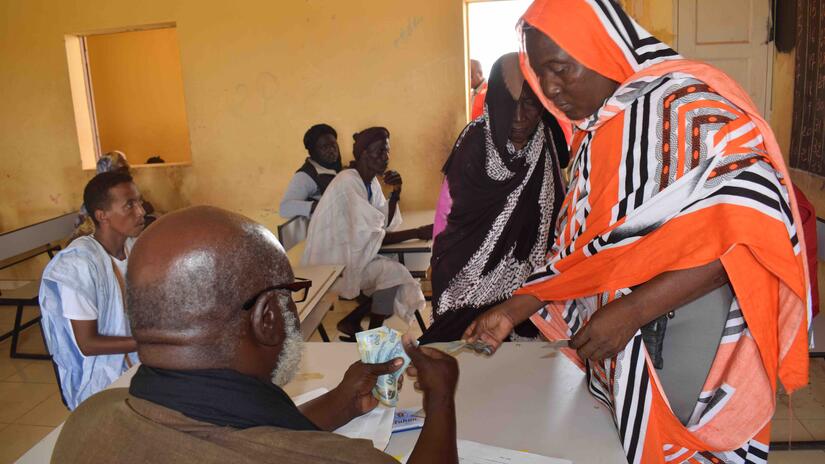By Moustapha Diallo, IFRC
It’s a hot September morning and the courtyard of the village school, usually quiet during the school holidays, is teeming with people.
Zeinab Bechir, a 54-year-old mother of six, and dozens of other men and women, take shelter under a tent to protect themselves from the scorching sun. They wait impatiently to be called by Mauritanian Red Crescent teams who are organising a cash distribution operation to help families affected by chronic food insecurity.
For Zeinab and most of the villagers, life is a constant struggle. Since the failure of the harvests – due to poor rainfall then flooding – feeding one’s family has become a daily battle. As a widow with many children in her care, the ordeal for Zeinab is even more difficult.
“Life is so hard,” says Zeinab. “There was nothing to prepare today.”
Amid this lean season, the most challenging period of the year when food stocks are low and prices high, the assistance she has received from the Mauritanian Red Crescent has been a lifeline. The cash aid has enabled her to buy basic foodstuffs and ensures that her family does not go to bed hungry.
“With this money, I’ll be able to buy food for at least a month,” she says. “This help from the Red Crescent has come at the right time.”
Dignity and choice
A thousand households in Barkeol district have received cash to help them cope with the tribulations of the lean season.
“Rather than providing food rations, we chose to give cash to households,” explains Mohamed Abdallahi, food security and livelihoods m,anager at the Mauritanian Red Crescent. “This allows them to buy food that better meets their needs with dignity and choice."
Although the cash distribution operation – supported by the IFRC – has brought a ray of hope amidst the gloom in Barkeol, many gaps remain. Of the 2,700 households targeted for cash in Barkeol, Guerrou and Moudjeria by the MRC and IFRC, only around 1,000 have so far received assistance.
More than half a million people in Mauritania, or 11 per cent of the population, are facing food insecurity during the lean season.
The IFRC has launched an emergency appeal for two million Swiss francs to help the Mauritanian Red Crescent assist 81,900 people. The funds raised should be used to provide cash and nutritional support to the most vulnerable people, while putting in place long-term solutions to build community resilience.
"The lack of funding is limiting our ability to reach thousands of families in need,” says Alex Claudon de Vernisy, head of the IFRC Cluster Delegation in Dakar: Senegal. “For example, our appeal is currently 20 per cent funded, thanks to a contribution from the Norwegian government. But in the face of persistent food insecurity, we must remain mobilized and increase the partnership for this emergency appeal.”





